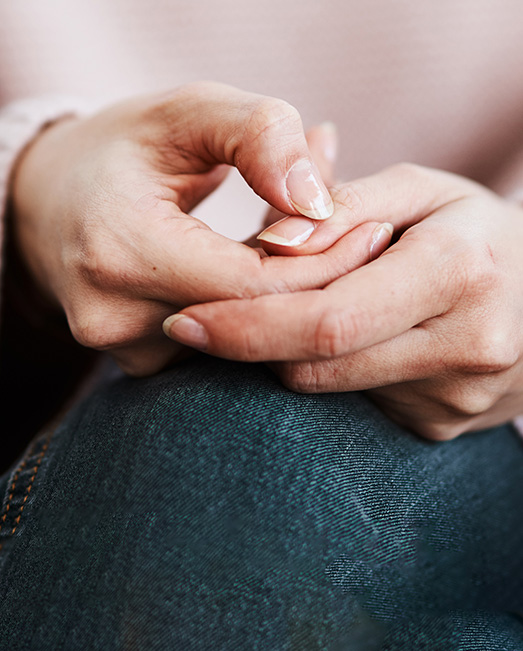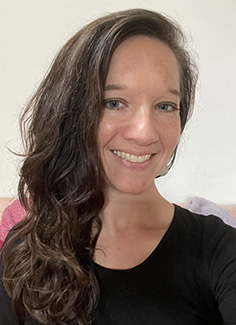Community
Copyright@ Australian Catholic University 1998-2026 | ABN 15 050 192 660 CRICOS registered provider: 00004G | PRV12008
Copyright@ Australian Catholic University 1998-2026 | ABN 15 050 192 660 CRICOS registered provider: 00004G | PRV12008

A few years ago, when Ulrike Marwitz was a social worker in Tasmania, she was supporting a mother who had been in two abusive intimate relationships. One of this woman’s ex-partners was nearing the end of his prison term, leaving Ulrike and her colleagues increasingly concerned at the risk he posed.
“He used significant physical violence in their relationship, and everyone was really worried about this guy who was about to get out of prison, because he was just so violent,” says Ulrike, who has worked in child protection for over a decade.
The woman’s other abusive relationship was with a man who was still actively stalking her.
“This guy was really controlling … he would always want to know where she was, and he’d follow her and try to control her social movements.”
While the focus of practitioners was on the physically violent man, the woman had other concerns. Ulrike recalls: “She said to me, ‘He’s not the main problem. He gets drunk and he gets violent, but I know exactly when that’s going to happen so I can work around it. I’m not scared of him. It’s this other guy who nobody else seems worried about that I’m scared of’.”
This experience, and others like it, left Ulrike questioning the gaps in the support services offered to those experiencing family violence.
“It struck me that this woman had these two really different experiences, and yet there was nothing in our practice guidance that supported us to understand the difference between the two,” she says.
“We had the same approach for both situations, but not all domestic violence situations are the same. I became frustrated with the fact that I had to go in and explain to women what they were experiencing, when that wasn’t what they were telling me.”
In looking for useful ways to channel her frustration, Ulrike Marwitz hit the books.
“I needed to see whether there was anything in the literature that spoke to what I was seeing in my practice,” she says. “And I found a lot.”
Ulrike examined the works of two researchers in particular: Professor Evan Stark, who is the world’s leading authority on coercive control – a type of domestic abuse that strips victims of power but doesn’t necessarily involve physical violence; and Professor Michael P. Johnson, whose highly-cited typology identified three dramatically different forms of partner violence: intimate terrorism, violent resistance, and situational couple violence.
While this research has been of undeniable theoretical value, its usefulness to the work of domestic violence practitioners is less clear.
However, guided by her experience as a social worker, and her exploration of the literature, Ulrike hypothesised that defining and categorising the different forms of domestic violence could be beneficial in practice, because it would enable social workers in a child protection setting to tailor their responses.
“It’s not about putting things into strict categories and boxes and saying, ‘coercive control always looks like this’, or ‘situational couple violence always looks like this’,” she says. “It’s about exploring what’s going on for that family, looking for the patterns and what the causal factors behind those things are, and then tailoring interventions to fit the situation.”
In early 2022, Ulrike joined ACU’s Institute of Child Protection Studies (ICPS), embarking on a PhD that would investigate how differentiating between types of intimate partner violence could improve practice and outcomes for women and children in the child protection system.
“I think my goal with the thesis is just to explore,” she says. “I don’t know for certain that the premise of differentiating between types of violence is useful, but I want to contribute to a knowledge and understanding of domestic and family violence that is more nuanced, more open to considering the individual circumstances of families, and listening to what women are actually telling us, and more open to the idea that a one-size-fits-all approach is not always going to be helpful.”
While domestic violence has been widely recognised as a national crisis, prompting several campaigns aimed at addressing the problem, recent research has found that rates of intimate partner violence have remained relatively stable for more than a decade.
Police respond to at least one family violence call-out every two minutes, and helplines are overrun with calls.
Meanwhile, the national action plan, led by the Federal Government in partnership with state and territory governments, puts the focus squarely on “major cultural and attitudinal change”. It advocates for the use of public education campaigns to shift community attitudes about gender, and what is legitimate and appropriate behaviour between partners and in families.
Ulrike Marwitz believes this focus falls short. In an article for Eureka Street, she argues that “telling people their behaviour is wrong and that they have to change is seldom enough to create change”.
“I think that cultural and attitudinal change is very important and we can’t ignore it,” she says. “But to say that is the only thing we need to do to create change oversimplifies the story. It will require far more than just attitudinal change to make Australia a safer place for women and children to live.”
The background to domestic violence is incredibly complex, Ulrike adds, and “doesn’t always look the same in each family”.
“With some men who use violence against an intimate partner, there are many issues at play like their own trauma background, their own experiences of violence in childhood, and issues like mental health and substance abuse,” she says.
“If we think that attitudinal change is going to erase all of those issues, frankly, I think we are deluding ourselves. With some men, attitudinal change will be helpful in addressing their abusive behaviours, but with others, whose problems are layered and complex, we need to take a more holistic approach that looks at all of the issues at play and addresses any trauma and attachment issues they might have.”
In the meantime, Ulrike hopes her research will shed new light on this important issue.
“We can’t go on ignoring the different types of domestic violence, and the many social issues that contribute to this problem – whether it’s intergenerational trauma, substance abuse, poverty or a range of other issues,” she says.
“These are all major contributors to the problem, and pretending these things don’t intersect at all is certainly not going to help either the perpetrators or the victims of family violence.”
Ulrike Marwitz is undertaking a Doctor of Philosophy at ACU exploring how types of domestic and family violence are addressed in child protection practice. Her research is informed by a social work career for Families SA, and the Tasmanian Department for Health and Human Services Child Safety.

Copyright@ Australian Catholic University 1998-2026 | ABN 15 050 192 660 CRICOS registered provider: 00004G | PRV12008